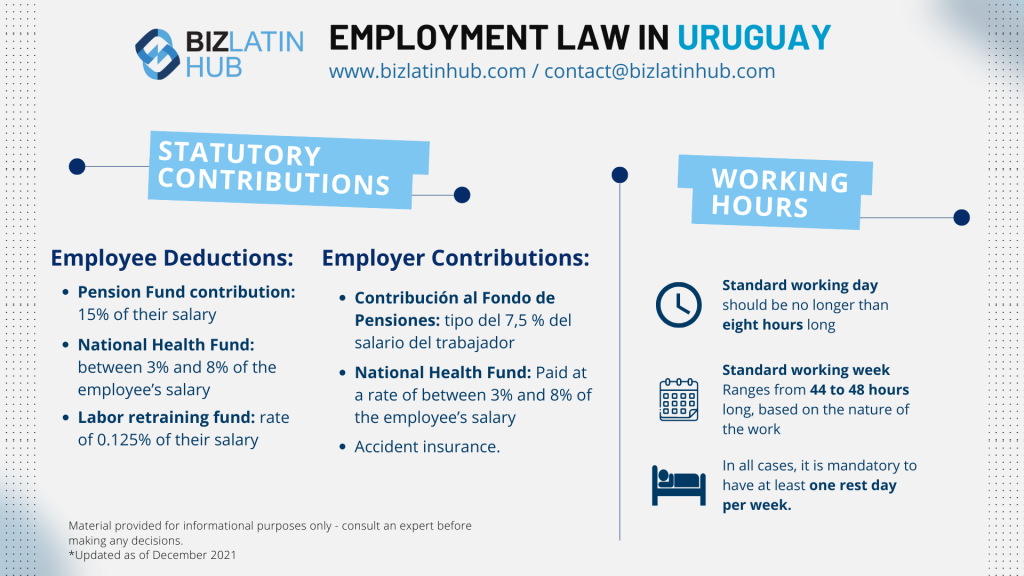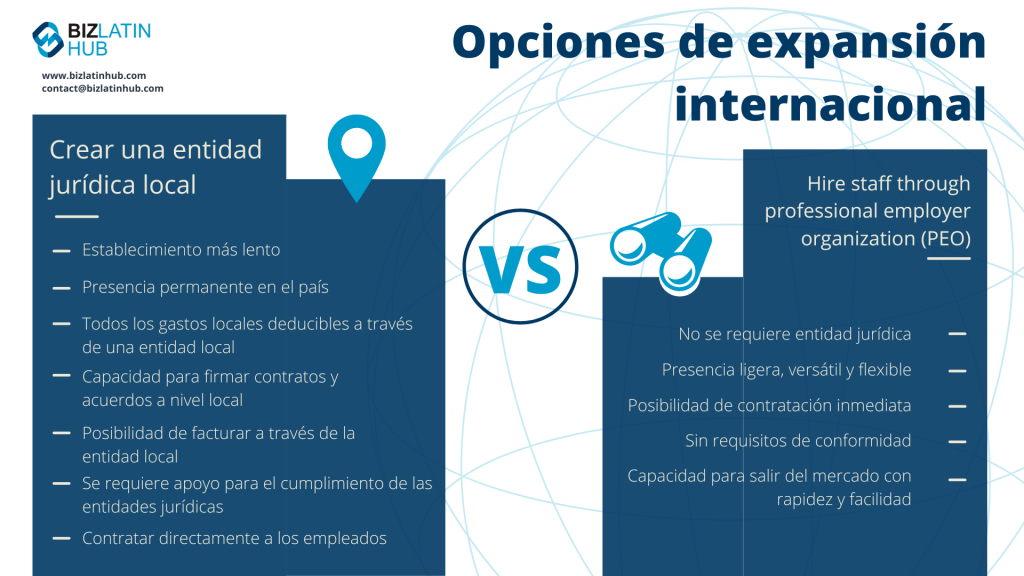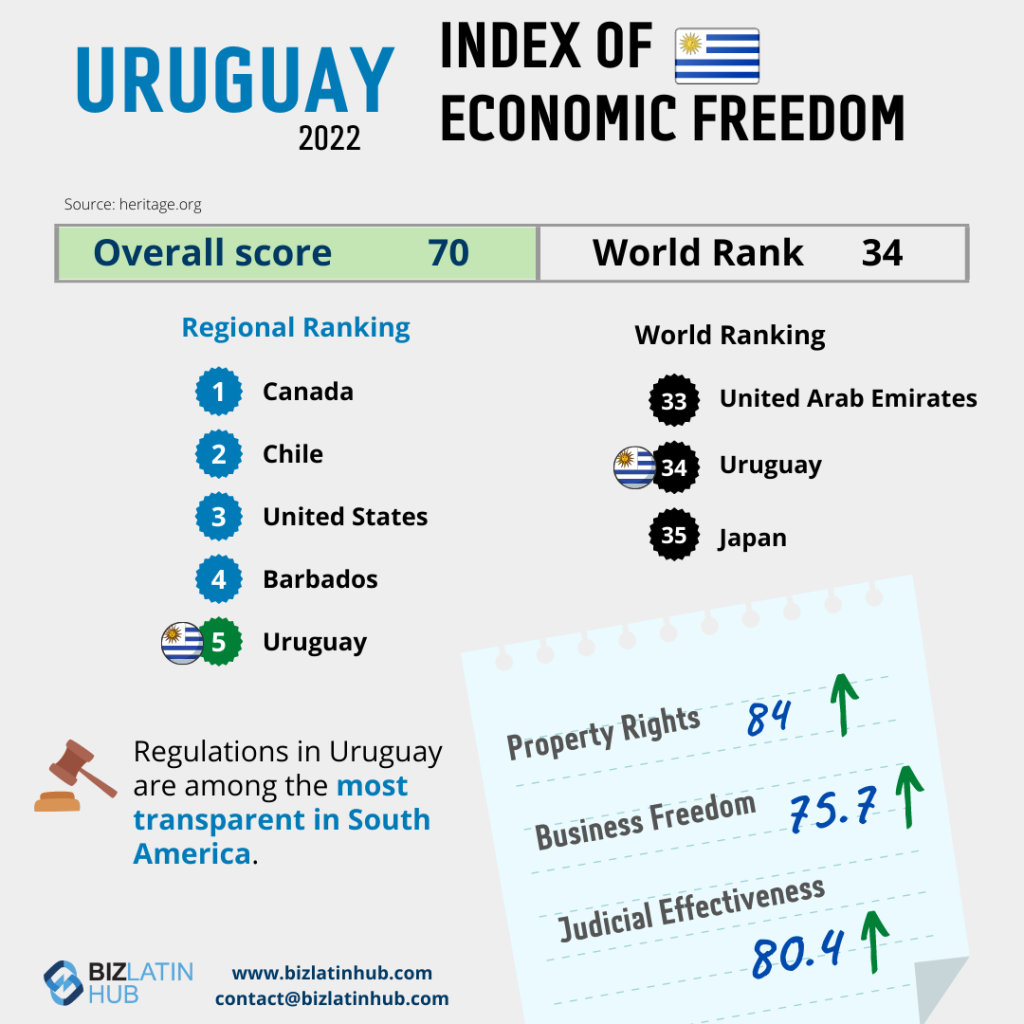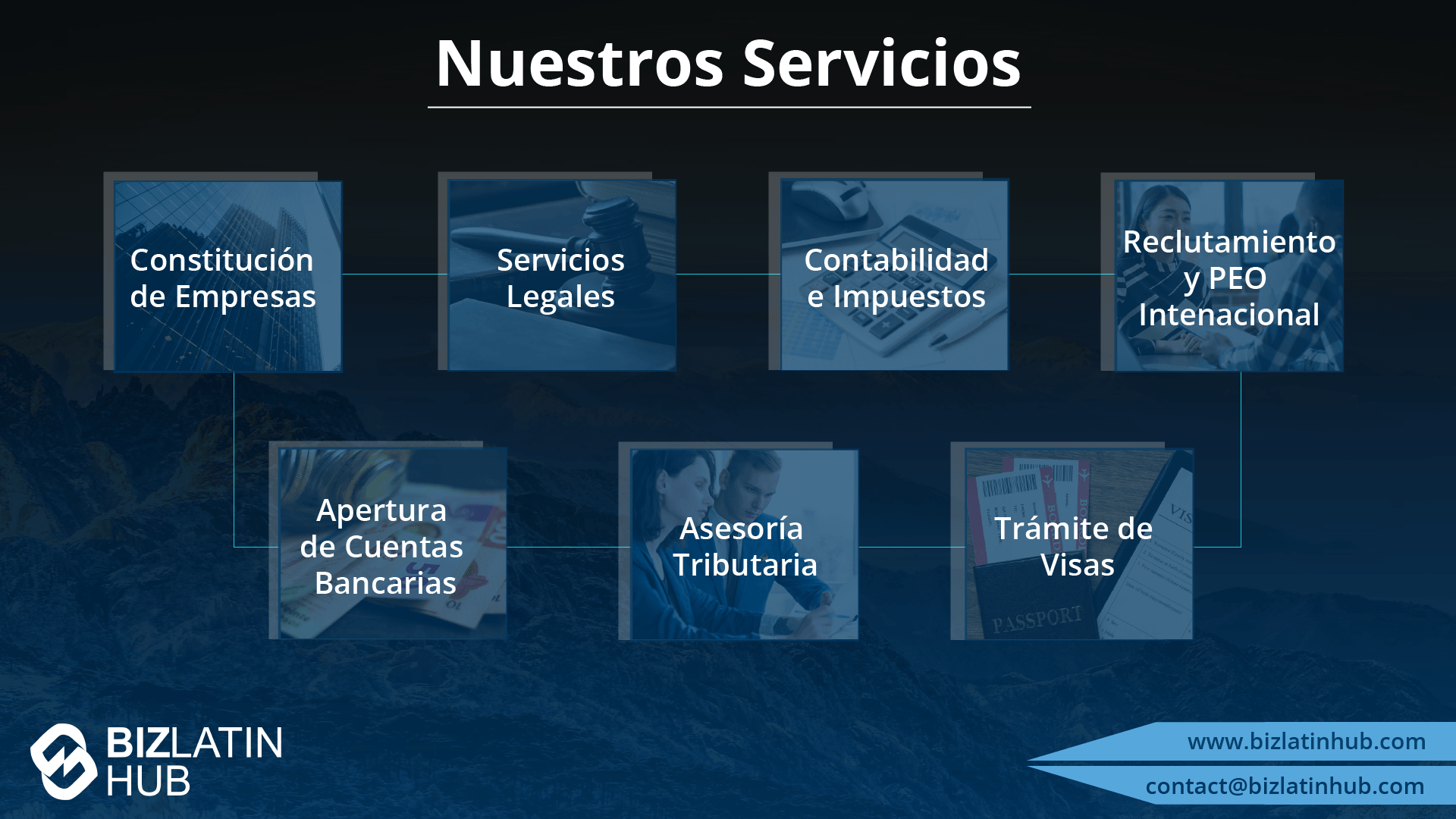Unlike many of its neighbors, the small South American nation of Uruguay has enjoyed relative political and economic stability, strong institutions, and comparatively low levels of perceived corruption. With such positive indicators, it’s little wonder that the country is a sought-after jurisdiction by foreign companies and investors – particularly in the tech sector. The country has invested heavily in education for years, and has had success attracting tech firms to its shores for company formation in Uruguay.
Key takeaways
| Key sectors in Uruguay | Key sectors in Uruguay include: Farming Energy Mining Plastics Telecommunications Tourism |
| Steps to hiring in Uruguay | A local advisor can help you with: Job adverts Networking CV assessment Interviewing Contract writing Onboarding |
| Legality of PEO in Uruguay | It is legal to hire employees through a professional employer organization in Uruguay. |
| Minimum wage in Uruguay | The current monthly minimum wage as of January 2025 is $U23,604 (aprox USD$545) |
| Employer contributions in Uruguay | 10.5% must be paid of an employee’s gross salary. |
Contratación en Uruguay: ¿Cuáles son las industrias más importantes del país?
Otro aspecto que puede influir en tu decisión de constituir una sociedad (y luego empezar a contratar en Uruguay) es hacerte una idea de cuáles son las industrias más grandes y de más rápido crecimiento en el país. Éstas son
- Carne de vacuno – Las exportaciones de carne de vacuno han aumentado desde que Uruguay se adhirió al acuerdo del Mercosur en 1991, lo que ha permitido al país llegar a los mercados internacionales.
- Energía – Aunque Uruguay importa casi todo su crudo, tiene capacidad para refinar diversos productos derivados del petróleo, y también posee abundantes fuentes de energía renovables.
- Minería – Aunque este sector no contribuye mucho a la economía del país, en los últimos años ha habido cierta actividad en la producción de oro y cemento, así como en la extracción de granito.
- Plásticos – Los plásticos son una de las industrias más importantes de Uruguay y uno de los principales motores de la economía nacional.
- Telecomunicaciones – La reducida población de Uruguay ha permitido al país lograr la digitalización del 100% de sus líneas principales. Recientemente se han realizado esfuerzos para liberalizar el sector de las telecomunicaciones, permitiendo la entrada de la empresa privada en el mercado de los operadores de telefonía móvil.
- Tourism – The travel and tourism sector accounts for around 10.3 percent of Uruguay’s GDP.
Los 6 mejores consejos y asesoramiento para empresas extranjeras que buscan contratar en Uruguay
Basándonos en nuestra amplia experiencia, podemos darte seis cosas a tener en cuenta para facilitar tu búsqueda para contratar en Uruguay:
- La burocracia está viva y coleando en Uruguay.
- ¿Cuáles son las prestaciones y derechos de los trabajadores en Uruguay?
- ¿Cómo funciona la nómina en Uruguay?
- ¿Dónde encontrar los empleados cualificados que necesitas?
- Cómo atraer y retener a los mejores talentos.
- Busca autónomos cuando sea necesario.
1. La burocracia está viva y coleando en Uruguay
Despite its reputation as an important technology hub in Latin America, setting up shop there is a lengthy, bureaucratic process. There are dozens of documents to collect – from application forms, company documents, approval requests, bank records, etc. Even if everything is in order, an incorporation application takes three months to be processed, and costs roughly USD$5,000. All this needs to be squared away before hiring in Uruguay can begin.
2. Prestaciones y derechos de los trabajadores en Uruguay
There’s a litany of employee perks and benefits that companies are legally required to give its full-time employees. They include a 13th monthly salary, 20 days’ vacation, overtime must be 2.5 times the regular salary amount, maternity and paternity leave, sick leave, health and pension benefits, and employee termination severance. Also, there are 10 public holidays per year in Uruguay.
3. Nóminas para empresas en Uruguay
Los empresarios suelen estar obligados a retener un total del 12,6% de los ingresos de un empleado en concepto de seguro médico, pensión y otras cosas (algo llamado “Garantía de Crédito Laboral”). Al contratar en Uruguay, las empresas tienen la opción de establecer sistemas de nómina internos o remotos: el primero es ideal para empresas independientes o filiales, y el segundo sistema añade los empleados uruguayos a la nómina de la empresa matriz.

4. Dónde encontrar los empleados cualificados que necesitas
Aparte de publicar ofertas de empleo en las redes sociales y en el sitio web de tu empresa, muchas empresas se anuncian en portales de empleo y sitios web de autónomos como UpWork, sobre todo para talentos relacionados con las TI y la tecnología. Las empresas también podrían beneficiarse de los servicios de una agencia de contratación, un cazatalentos local para puestos de alto nivel o, de hecho, aprovechar los servicios de contratación y OEP que ofrece Biz Latin Hub.
5. Atraer y retener a los mejores talentos con salarios competitivos
Arguably the main driver of the offshoring/nearshoring phenomenon in Latin America is the ability to get highly qualified workers for a fraction of the labor costs of the United States or Europe. This rings true in Uruguay, where labor costs in the tech sector were until recently 40 percent lower than in the United States. But the recent surge in demand for Latin American tech talent has sent salaries skyrocketing; programmers, software developers, designers and engineers have been reported to receive compensation of up to USD$72,000.
6. Buscar talentos remotos/freelance cuando sea necesario
Si contratar en Uruguay no va según lo previsto, puedes contratar a un freelance, trabajador a distancia y/o contratista independiente para cubrir una necesidad inmediata. Esto puede ser de forma temporal o más permanente, dependiendo de lo que acuerden tu empresa y el contratista. Si prefieres contratar directamente a autónomos cualificados, prueba a buscar en Toptal, UpWork o buscando “desarrolladores de software en Uruguay” en Linkedin, por ejemplo.
How much it costs to hire people in Uruguay
The cost of hiring in Uruguay is less than it would be in richer nations, yet workers are often well qualified and skilled. With significant investment in education over a number of years, the Uruguay now has a surfeit of graduates in the labor market that it cannot provide local jobs for. This means that the labor market in Uruguay is relatively competitive for an incoming prospective employer.
The minimum wage in Uruguay is $U23,604 (aprox USD$545). However, this is not necessarily the rate that you should be offering. In top sectors that require qualified and skilled workers, you will need to offer at least market standard rate. A local hiring expert in Uruguay will be invaluable in making sure that you are not overpaying or offering unattractive rates that make it hard to recruit quality talent.
Two options for hiring: establish a company or PEO
When entering the market and hiring in Uruguay, there are essentially two options available to investors and entrepreneurs. The most common way of doing so is through full company formation to establish a presence in the jurisdiction. However, this may take time and effort, meaning that it is worth considering another option as well, using a Professional Employer Organization (PEO).

PEO: fast and agile
A Professional Employer Organization (PEO), also known as a ‘Registered Employer’ or ‘Employer of Record’, is an organization that provides and supports companies with their human resources functions, from the early stages of recruitment to the payment of taxes and benefits. PEOs undertake the fundamental and time-consuming tasks of human resources teams, allowing companies to focus on the growth and success of their business.
The services of a PEO are particularly useful when businesses seek to hire a local workforce but do not wish to establish a local legal entity. Simply put, a PEO makes it easy to hire staff in Uruguay through an outsourced provider.
It means you can enter the market and start hiring quickly, without having to commit to full entry until you are sure that it is what you want to do. It is worth noting that regionally there is beginning to be more regulation and PEO in Uruguay may not be viable in the future.
The long-term option: direct hiring
This is the gold standard of hiring in Uruguay, as it will give you full control over your employees as well as being sure that you will be compliant for the long term. It also gives you a higher status with potential job applicants, who will see you as a more secure long-term employer.
Before you start hiring employees in Uruguay, you will first need to get a sense of the legal, financial and cultural lay of the land. Things such as how to sort out the red tape associated with incorporation and how to manage payroll, for example. With a permanent legal presence in Uruguay, you will be fully liable for compliance with local law.
A local expert will help when hiring in Uruguay, as they will have an extensive network of qualified professionals for top jobs as well as a good idea of the local labor market. They will be able to advise on the best rates to offer and what type of profile you should be targeting. With anti-discrimination legislation important in Uruguay, especially for top jobs, they can make sure you are making a fair offer which complies with local law.
After placing adverts and receiving applications, you will want to move towards interviewing potential candidates. This should be done by both a team manager and HR representative at minimum, to make sure that everything is watertight in legal terms. You may want to include other people into the process in order to make a better assessment of the candidate.
It is entirely possible that you may wish to have a second interview, possibly involving other team members as discussed above. It is also common in the region and when hiring in Uruguay to provide candidates with an aptitude task to be completed. This usually takes the form of a dummy task that simulates the type of job that will be done in the future and confirm that they possess the skills cited on their CV.
Contracts, too, will be important. A local advisor will be up to speed on what you can and cannot offer. Bear in mind that you will have to follow all the rules established by Uruguay. This includes details that confirm the point of termination for limited-term work.
Finally, your local advisor will be able to help you with the stages of both the hiring and onboarding process. They will make sure that you comply with standard requirements such as compulsory medical checks and make sure that any probation period is within the boundaries of those established by the labor law in Uruguay. This is generally NUMBER WEEKS/MONTHS.
Labor laws and regulations in Uruguay

Before making a move into the jurisdiction, it’s important for companies to understand the labor rights and responsibilities of both employers and employees in Uruguay. What follows are a few things that foreign business owners should know about when it comes to the local work culture:
- Work hours – The standard workday in Uruguay is eight hours, with the standard workweek up to 48 hours.
- Public holidays – There are 10 public holidays in Uruguay each year.
- Vacation time – Workers in Uruguay are eligible for 15 days of vacation annually. Women are entitled to 13 weeks’ maternity leave.
- Contract types – There are essentially two types of contract in Uruguay, indefinite employment and fixed-term employment
FAQs on hiring in Uruguay
Based on our extensive experience these are the common questions we receive from clients when looking to hire in Uruguay.
1. Why hire talent in Uruguay?
Hiring in Uruguay offers access to a large talent pool that is located in the same time zone as the North American market, is culturally similar, and is more economical. The combination allows a company to complement an existing North American based team or to establish an independent nearshoring center within the region.
2. Can I hire top talent in Uruguay?
Arguably the main driver of the offshoring/nearshoring phenomenon in Latin America is the ability to get highly qualified workers for a fraction of the labor costs of the United States or Europe. This rings true in Uruguay, where labor costs in the tech sector were until recently 40 percent lower than in the United States.
But the recent surge in demand for Latin American tech talent has sent salaries skyrocketing; programmers, software developers, designers and engineers have been reported to receive compensation of up to USD$72,000 annually.
3. What is the level of English for professionals in Uruguay?
The level of English in Uruguay is regionally impressive and in key white collar sectors it is even better. University graduates are expected to complete English language proficiency to at least an intermediate level.
4. What benefits must be offered when hiring in Uruguay?
There’s a litany of employee perks and benefits that companies are legally required to give its full-time employees. They include a 13th monthly salary, 20 days’ vacation, overtime must be 2.5 times the regular salary amount, maternity and paternity leave, sick leave, health and pension benefits, and employee termination severance. Also, there are 10 public holidays per year in Uruguay.
Biz Latin Hub can help you with hiring in Uruguay
At Biz Latin Hub, we offer a comprehensive range of market entry and back-office solutions across Latin America and the Caribbean.
With offices in key cities across the region, along with trusted partners in other markets, our extensive reach makes us well-suited to support cross-border operations and multi-jurisdiction market entries.
As well as knowledge about hiring in Uruguay, our portfolio of services includes hiring & PEO accounting & taxation, company formation, bank account opening, and corporate legal services.
Contact us today to find out more about how we can assist you in finding top talent or otherwise doing business in Latin America and the Caribbean.
If this article on tips for hiring in Uruguay was of interest to you, check out the rest of our coverage of the region. Or read about our team and expert authors.






